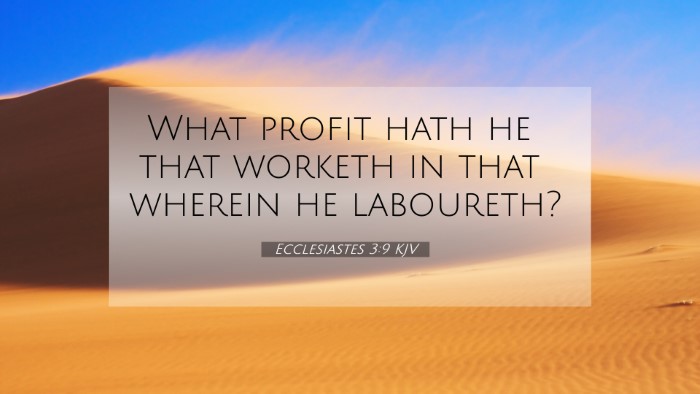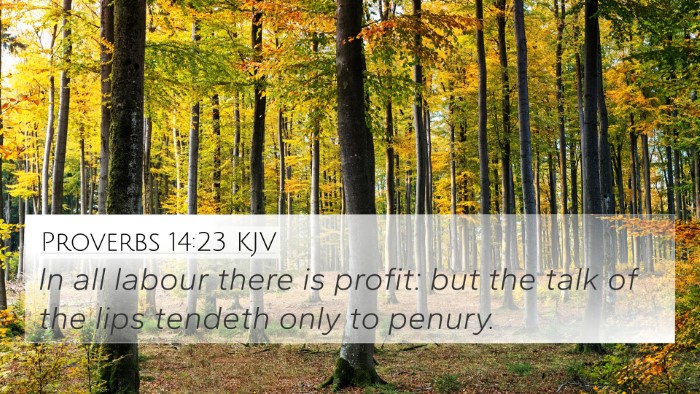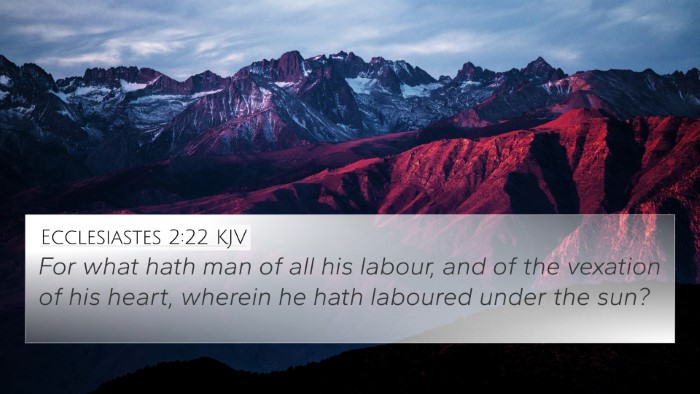Understanding Ecclesiastes 3:9
Ecclesiastes 3:9 states: "What profit hath he that worketh in that wherein he laboureth?" This verse poses a profound question regarding the purpose and profit of human effort.
Summary of Key Insights
According to public domain commentaries such as those by Matthew Henry, Albert Barnes, and Adam Clarke, this verse invites readers to reflect on the value of labor and the outcomes of human endeavors. The context of this verse falls within a larger discourse on the times and seasons of life, as established earlier in the chapter.
Matthew Henry's Commentary
- Henry emphasizes the vanity of human effort when devoid of divine purpose, suggesting that mere toil is ultimately unfulfilling without a higher aim.
- He interprets this verse as a contemplation on the transitory nature of worldly achievements and the futility of pursuing labor for labor's sake.
Albert Barnes' Analysis
- Barnes highlights the rhetorical nature of the question asked in this verse, indicating that it seeks to open the eyes of the reader to the limitations of human activity.
- He connects this verse to the broader theme of Ecclesiastes: the search for meaning in life’s fleeting moments.
Adam Clarke's Explanation
- Clarke notes that this verse points toward a universal inquiry about the fruits of labor; it questions whether human toil yields meaningful results in the grand scheme of existence.
- He elaborates on the notion that without a transcendent goal, labor may result in spiritual despondency.
Thematic Connections and Cross-References
This verse resonates with many other biblical passages that explore similar themes of labor, purpose, and the transient nature of life. Here are some relevant cross-references:
- Psalm 127:1: "Except the LORD build the house, they labour in vain that build it." - Echoes the futility of work without divine involvement.
- Proverbs 14:23: "In all labor there is profit: but the talk of the lips tendeth only to penury." - Affirms the value of labor while warning against empty words.
- Colossians 3:23-24: "And whatsoever ye do, do it heartily, as to the Lord, and not unto men..." - Encourages believers to find purpose in their work through a Christ-centered approach.
- 1 Corinthians 15:58: "Therefore, my beloved brethren, be ye stedfast, unmoveable, always abounding in the work of the Lord..." - Provides motivation that labor in the Lord is never in vain.
- Revelation 14:13: "...Blessed are the dead which die in the Lord from henceforth: Yea, saith the Spirit, that they may rest from their labours; and their works do follow them." - Communicates the eternal significance of righteous labor.
- Philippians 2:14-16: "Do all things without murmurings and disputings; that ye may be blameless and harmless..." - Relates the intention behind labor and its role in testimony.
- James 4:14: "For what is your life? It is even a vapour, that appeareth for a little time, and then vanisheth away." - Reflects on life's brevity, tying back to the theme of valuing time and effort.
Connecting Biblical Themes
The exploration of Ecclesiastes 3:9 encourages believers to consider the following:
- Understanding the duality of labor: its earthly benefits versus eternal implications.
- How to find cross-references in the Bible to deepen one's understanding of labor's spiritual significance.
- Building connections between the teachings of the Old and New Testaments regarding work and purpose.
Tools for Better Understanding
Utilizing comprehensive Bible reference resources and Bible concordances can enhance one’s study. Tools such as a Bible cross-reference system provide valuable aids to identify connections between verses.
Conclusion
Ultimately, Ecclesiastes 3:9 invites audiences to engage in cross-referencing Biblical texts within the context of their spiritual journeys. By diligently examining these connections, believers can find deeper meaning in their labors and lives.








